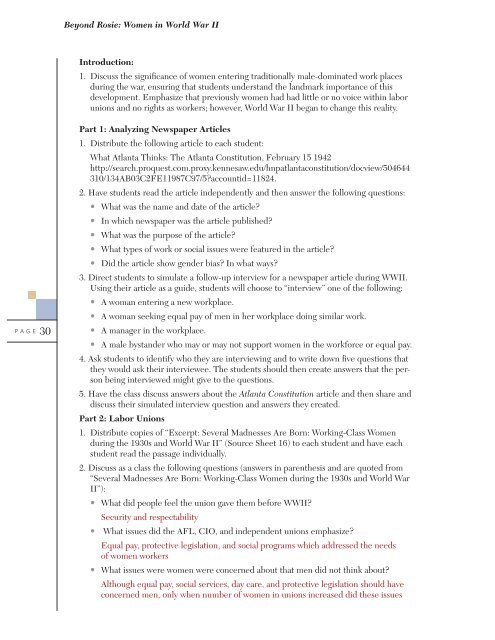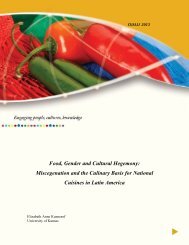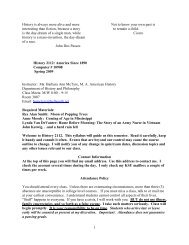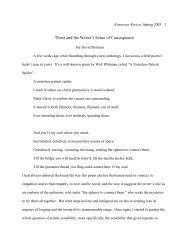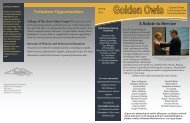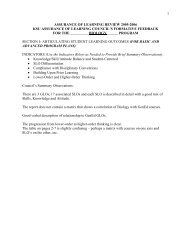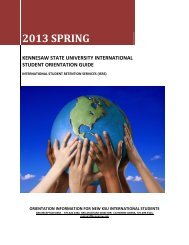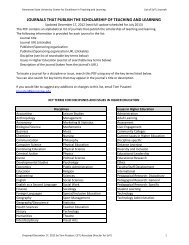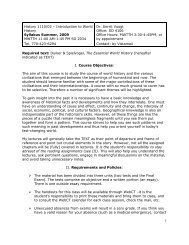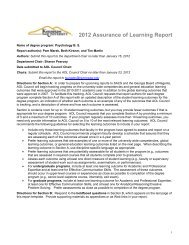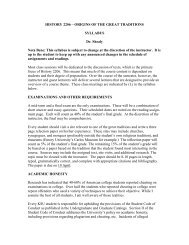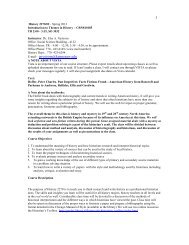Beyond Rosie: Women in World War II - Kennesaw State University
Beyond Rosie: Women in World War II - Kennesaw State University
Beyond Rosie: Women in World War II - Kennesaw State University
You also want an ePaper? Increase the reach of your titles
YUMPU automatically turns print PDFs into web optimized ePapers that Google loves.
<strong>Beyond</strong> <strong>Rosie</strong>: <strong>Women</strong> <strong>in</strong> <strong>World</strong> <strong>War</strong> <strong>II</strong><br />
Introduction:<br />
1. Discuss the significance of women enter<strong>in</strong>g traditionally male-dom<strong>in</strong>ated work places<br />
dur<strong>in</strong>g the war, ensur<strong>in</strong>g that students understand the landmark importance of this<br />
development. Emphasize that previously women had had little or no voice with<strong>in</strong> labor<br />
unions and no rights as workers; however, <strong>World</strong> <strong>War</strong> <strong>II</strong> began to change this reality.<br />
PAGE 30<br />
Part 1: Analyz<strong>in</strong>g Newspaper Articles<br />
1. Distribute the follow<strong>in</strong>g article to each student:<br />
What Atlanta Th<strong>in</strong>ks: The Atlanta Constitution, February 15 1942<br />
http://search.proquest.com.proxy.kennesaw.edu/hnpatlantaconstitution/docview/504644<br />
310/134AB03C2FE11987C97/5?accountid=11824.<br />
2. Have students read the article <strong>in</strong>dependently and then answer the follow<strong>in</strong>g questions:<br />
• What was the name and date of the article?<br />
• In which newspaper was the article published?<br />
• What was the purpose of the article?<br />
• What types of work or social issues were featured <strong>in</strong> the article?<br />
• Did the article show gender bias? In what ways?<br />
3. Direct students to simulate a follow-up <strong>in</strong>terview for a newspaper article dur<strong>in</strong>g WW<strong>II</strong>.<br />
Us<strong>in</strong>g their article as a guide, students will choose to “<strong>in</strong>terview” one of the follow<strong>in</strong>g:<br />
• A woman enter<strong>in</strong>g a new workplace.<br />
• A woman seek<strong>in</strong>g equal pay of men <strong>in</strong> her workplace do<strong>in</strong>g similar work.<br />
• A manager <strong>in</strong> the workplace.<br />
• A male bystander who may or may not support women <strong>in</strong> the workforce or equal pay.<br />
4. Ask students to identify who they are <strong>in</strong>terview<strong>in</strong>g and to write down five questions that<br />
they would ask their <strong>in</strong>terviewee. The students should then create answers that the person<br />
be<strong>in</strong>g <strong>in</strong>terviewed might give to the questions.<br />
5. Have the class discuss answers about the Atlanta Constitution article and then share and<br />
discuss their simulated <strong>in</strong>terview question and answers they created.<br />
Part 2: Labor Unions<br />
1. Distribute copies of “Excerpt: Several Madnesses Are Born: Work<strong>in</strong>g-Class <strong>Women</strong><br />
dur<strong>in</strong>g the 1930s and <strong>World</strong> <strong>War</strong> <strong>II</strong>” (Source Sheet 16) to each student and have each<br />
student read the passage <strong>in</strong>dividually.<br />
2. Discuss as a class the follow<strong>in</strong>g questions (answers <strong>in</strong> parenthesis and are quoted from<br />
“Several Madnesses Are Born: Work<strong>in</strong>g-Class <strong>Women</strong> dur<strong>in</strong>g the 1930s and <strong>World</strong> <strong>War</strong><br />
<strong>II</strong>”):<br />
• What did people feel the union gave them before WW<strong>II</strong>?<br />
Security and respectability<br />
• What issues did the AFL, CIO, and <strong>in</strong>dependent unions emphasize?<br />
Equal pay, protective legislation, and social programs which addressed the needs<br />
of women workers<br />
• What issues were women were concerned about that men did not th<strong>in</strong>k about?<br />
Although equal pay, social services, day care, and protective legislation should have<br />
concerned men, only when number of women <strong>in</strong> unions <strong>in</strong>creased did these issues


